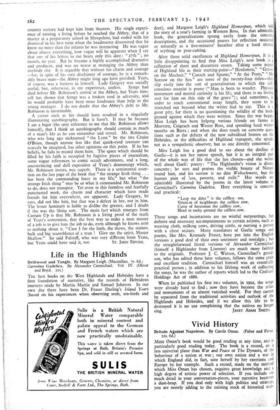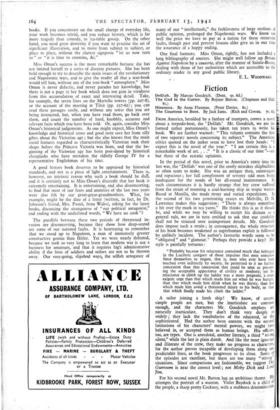Vivid History
MISS OMAN'S book would be good reading at any time, and is particularly good reading today. The book is a record, on a less universal plane than War and Peace or The Dynasts, of the behaviour of a nation at war ; our own nation and a war in which England did, in fact, save herself by her exertions and Europe by her example. Such a record, made on the method which Miss Oman has chosen, requires great knowledge and a high degree of artistic power of selection. If you include too much detail in your conversation-pieces, your narrative becomes a dust-heap. If you deal only with high politics and strategy. you are merely adding to the existing stock of historical text'
books. If you concentrate on the small change of everyday life, your work becomes trivial, and you reduce history, which is far more tragedy than comedy, to tea-table gossip. On the other hand, you need great dexterity if you want to practise the art of significant illustration, and to move from subject to subject, or place to place, without the clumsy signposts " let us now turn to " or " it is time to examine, &c."
Miss Oman's success is the more remarkable because she has not limited herself to a series of discrete pictures. She has been bold enough to try to describe the main issues of the revolutionary and Napoleonic wars, and to give the reader all that a text-book would tell him, without any of the text-book " atmosphere." Miss Oman is never didactic, and never parades her knowledge, but there is not a page in her book which does not gain in vividness from this accumulation of exact and interesting detail. Take, for example, the seven lines on the Martello towers (pp. 207-8), or the account of the meeting at Tilsit (pp. 257-62) ; you can read these passages easily, and without any sense that you are being instructed,. but, when you have read them, go back over them, and count the number of hard, knobbly, accurate and relevant faCts which you have been told. Or, again, consider Miss Oman's historical judgements. As one might expect, Miss Oman's knowledge and historical sense and good taste save her from silly gibes about the Victorian age ; but she also knows that the main social features regarded as characteristically Victorian took their shape before the Princess Victoria was born, and that the be- ginning of the Victorian age has been post-dated by historical cheapjacks who have mistaken the elderly George IV for a representative Englishman of his time.
A good history book deserves to be appraised by historical standards, and not as a piece of light .entertainment. There is, however, no intrinsic reason why such a book should be dull, and it is certainly not to Miss Oman's discredit that her book is extremely entertaining. It is entertaining, and also disconcerting, to find that most of our fears and anxieties of the last two years were also felt by our great-great-grandmothers. What, for example, might be the date of a letter (written, in fact, by Dr. Johnson's friend, Mrs. Piozzi, from Wales), asking for the latest books, discussing the strangeness of "our political antagonist," and ending with the underlined words, " We have no cook "?
The parallels between these two periods of threatened in- vasion are disconcerting, because they show how deep-seated are some of our national faults. It is heartening to remember that we stood up to Napoleon, a man of immensely greater constructive genius than Hitler. Yet we were nearly defeated, because we took so very long to learn that modem war is not a business for amateurs, and that it requires high administrative ability if the lives of soldiers and sailors are not to be thrown away. Our easy-going, slipshod ways, the selfish arrogance of many of our " intellectuals," the fecklessness of large sections of public opinion, prolonged the Napoleonic wars. We know too well the price we have to pay as a nation for these recurrent faults, though past and present lessons alike give us in our time the assurance of a happy ending.
One final footnote. Miss Oman, rightly, has not included a long bibliography of sources. She might well follow up Britain Against Napoleon by a causerie, after the manner of Sainte-Beuve, dealing with those of her authorities which are accessible to the ordinary reader in any good public library.
E. L. WOODWARD.



























 Previous page
Previous page